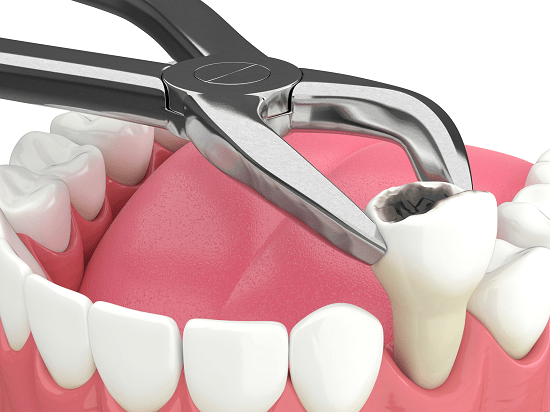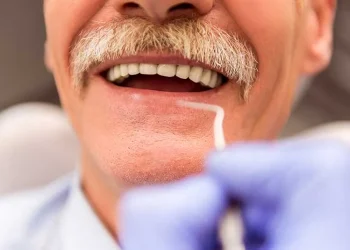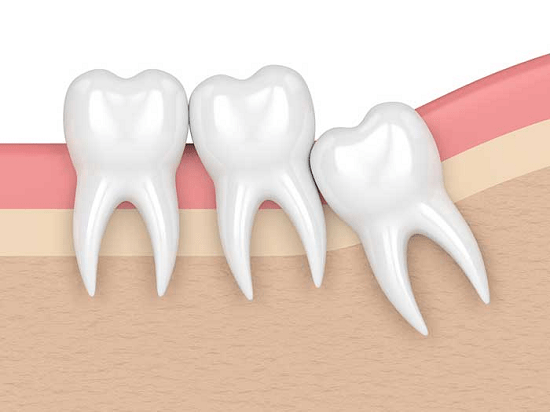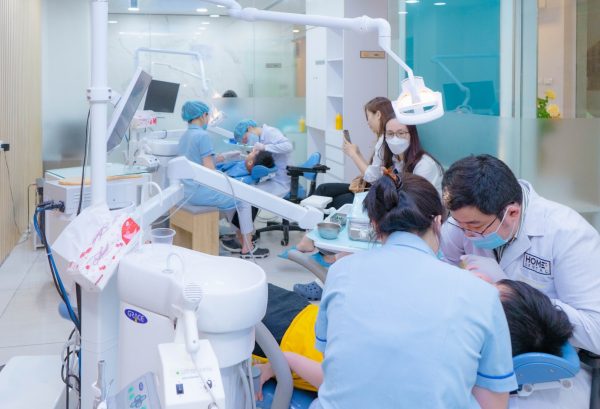Care after wisdom tooth extraction is a necessary skill to protect the oral wound. Dr. Nguyen Anh Ngoc will share with patients how to take care of their oral health after wisdom tooth extraction according to dental standards.
Contents
- 1 Manifestations occurring after wisdom tooth removal
- 2 What to do to relieve wisdom tooth pain and bleeding
- 3 Home Dental answers questions about wisdom tooth extraction
- 3.1 What to abstain from eating after wisdom teeth extraction?
- 3.2 How long does it take to heal after getting wisdom teeth extracted?
- 3.3 After how many days can I eat normally?
- 3.4 Activities not to do after wisdom tooth extraction
- 3.5 How many days should I rest after getting wisdom tooth removed?
- 3.6 How to take care of my oral health after wisdom tooth extraction?
- 3.7 Can I take a shower after finishing the wisdom tooth extraction process?
- 3.8 Should I rinse my mouth with saline after wisdom tooth extraction?
- 3.9 What is Alveolar Osteoarthritis? How to prevent it?
- 3.10 Can I drink water after wisdom tooth extraction?
- 3.11 Can I talk after wisdom tooth extraction?
- 3.12 After 2 weeks of wisdom tooth extraction, what will happen?
Manifestations occurring after wisdom tooth removal
After wisdom tooth extraction, we often experience some symptoms such as bleeding, swelling in the cheek area, toothache, numbness in the cheeks, lips, hard jaw… These conditions can occur strongly on the first day. After removing the wisdom tooth root, each person can take from a few days to longer than a few weeks to recover from the wound.
Bleed
Fresh blood oozes out in the socket. Excessive bleeding is due to the fact that for a tooth to be extracted, it is necessary to cut the gums. Therefore, the blood vessels are broken, causing blood to flow from the soft tissue out.
Swelling, bruise
Similar to the causes of bleeding after tooth extraction, the swelling and bruises of the cheek area is caused by the disruption of blood vessels, plus invasive manipulations to the anatomical structure inside the jawbone.
These manifestations are very normal when the body is bumped, scratched and soft tissue open. So don’t worry too much about it. As long as we use hot compresses, cold compresses, and anti-inflammatory antibiotics, this bruise will disappear after 3 days.
Pain in the area of the gingival incision
Any manipulation that affects soft tissues in the body causes pain, especially in the oral area. With minor surgery to remove wisdom teeth, the common manifestation is pain in the wound on the gums.
The main cause is that the gums have to be cut open, the blood vessels burst, and the tooth nerve is pulled up along the tooth.
Numbness, loss of sensation in some parts of the face
The phenomenon of numbness is explained by the dentist as due to the process of removing the wisdom tooth root, the nerves below the alveolar bone are affected. Patients may experience numbness and sensitivity in the cheeks, lips, and jaw angle where the tooth is extracted.
However, if you see the phenomenon of jaw stiffness, loss of sensation for more than 4 days, you should immediately call your dentist to have a scan of the tooth structure for treatment.

What to do to relieve wisdom tooth pain and bleeding
Dentists recommend that customers do the following things to reduce pain and prevent excessive bleeding.
To reduce bleeding, after tooth extraction, the patient must bite a cotton gauze for about 30 minutes. Then remove it and wait for the blood to clot. If you go home and still bleed, you can continue to suck on a gauze pad to absorb the blood.
Take pain relievers as prescribed by your dentist and read the instructions carefully before taking them. Two common pain relievers are paracetamol and ibuprofen. After taking pills, you can see a significant reduction in pain in the mouth area.
Take a few small ice cubes covered with a face towel and apply to the swollen area. Cold compress helps circulate blood vessels in the injured area, thereby reducing pain, sensitivity, numbness, swelling of the lips and cheeks.
Dip a washcloth in warm water (not above 50 degrees Celsius), wring it out and apply it around the cheek area. Hot compress dissolves bruises, dissolves blood clots, dilates blood vessels. The swelling around the alveolar bone will be reduced.
After about 6 to 24 hours, you can gargle with salt water to eliminate bacteria on the wound.Do not move your jaw vigorously or remove blood clots to limit bleeding.
Home Dental answers questions about wisdom tooth extraction
The dental team at Home Dental will answer the following 12 most frequently asked questions when removing wisdom teeth.
What to abstain from eating after wisdom teeth extraction?
We need to avoid foods with abnormal temperatures, easy to crumble, easy to get stuck in the bones of the teeth. Specifically:
- Hard, crunchy, chewy, easy to stick foods such as fruits, cartilage, bones, ribs, rice paper, marshmallows, chips, popcorn…
- Food from grains, seeds such as peanuts, beans, chestnuts, cashews …
- Hot, cold or spicy, sour dishes such as hot pot, soup, ice cream, ice, chili sauce, spicy noodles, lemon, chili…
- Sweets, carbonated drinks, caffeine such as fruit soft drinks, coffee, wine, beer…
- Completely quit the bad habit of smoking
- Crispy and crumbly foods that can crumble in your mouth
How long does it take to heal after getting wisdom teeth extracted?
About 2-3 days after wisdom tooth extraction, the symptoms of swelling, pain, and bleeding are significantly reduced. After 3-4 weeks, the wound in the socket where the wisdom tooth was extracted will heal almost completely. You can live and eat as usual.
The specific symptoms from extraction to healing are as follows:
1 hour after extraction
After a few minutes of extraction, the anesthetic wears off. Customers feel a little pain, sensitivity in the jaw. The degree of pain is mild or severe depending on the body of each person. Some people have occasional dull pain that lasts up to 2-3 hours, some people have severe pain, but it only hurts within the first hour.
During the first and second day
Fresh blood stopped flowing, blood clots appeared around the extraction site. It may feel a little uncomfortable. However, this is a normal development, only when a blood clot forms can the wound heal quickly.
Days 1 and 2 are the peak of cheek swelling. Actively applying cold and hot compresses will quickly eliminate swelling.
3 days later
Most clients reduce numbness, swollen cheeks and pain. At this time, you can eat and chew normally, but only soft foods can be eaten.
1 week later
No more common symptoms. However, it is still possible to see a slight sting in the sutured area and stiff jaw. Those who have pain and swelling lasting more than 1 week may have experienced some mild complications after wisdom tooth extraction.
After 7 days, go to have the suture removed (if it is a regular thread) and notify the dentist of these unusual manifestations. According to some studies, each week the gum tissue will heal by 1mm.
From 2 weeks to 1 month later
The jaw is completely healed. Tissues in the gum area regenerated and healed quickly. The wisdom tooth root is covered with mucosa, and the gums also heal gradually. At this time, eating and oral hygiene can return to the way it was before the tooth was extracted.
After how many days can I eat normally?
According to Home Dental’s dentists, after about 5 hours of wisdom tooth extraction, you can absorb soft foods that are easy to swallow such as porridge, soup, mashed potatoes … but can’t eat rice right away. Regarding the diet, let’s consult with a doctor to see which foods are inedible and which are acceptable.
After about 3-5 days, you can eat soft foods, pasty rice, soft cooked foods, pureed, ground red meat…
If you don’t listen to the doctor and don’t follow your diet strictly, the hard food can affect the gum suture. Blood clots at the incision will fall out, the risk of infection of the oral cavity is very high.
Nutritious food to add to your diet:
- Ripe bananas
- Yogurt, cheese
- Vegetable soup
- Fresh fruit smoothies
- Non-fishy seafood such as salmon, shrimp, crab.
Activities not to do after wisdom tooth extraction
The healing process of the gums can take a long time if the wisdom tooth root and the head area are affected a lot. We need to keep in mind the following prohibited actions:
- Do not drink from straws, spit, sneeze
- Do not talk, laugh too much, wear makeup…
- Do not participate in sports for the first day after wisdom tooth extraction
- Stay away from hard food, alcoholic drinks, gas
- Do not take aspirin because it can make the blood bleed a lot, thin the blood, and make it difficult to form blood clots
- Only apply cold compress for the first 1-2 days, then combine with hot compresses to accelerate wound regeneration and healing
- Do not put sharp objects, tongues, chopsticks, spoons, fingers, towels into the position where the tooth has just been extracted
- Only rinse your mouth at a light speed, do not rinse your mouth too vigorously with salt water
- Do not lie on the cheek that has just extracted the tooth.
How many days should I rest after getting wisdom tooth removed?
Dentists recommend, after tooth extraction, we should rest for the first 1 to 2 days. Getting enough rest and sleep helps restore health quickly. Rest and avoid exercise is also an effective way to protect the face.
From the 2nd to 5th day on, if the body gets better, the symptoms gradually decrease, you can go back to work. However, just doing the job doesn’t take much effort. If the customer’s job requires hard labor, rest for a few more days.
How to take care of my oral health after wisdom tooth extraction?
After completing the minor surgery to remove the root of wisdom tooth, the customer needs to sleep, rest, relax so that the alveolar points can quickly regenerate the wound and the blood is stabilized. In the first 3 days, actively reduce swelling and pain by applying cold and hot compress.
When the sensitive stage is over, about a week later, you can brush your teeth. Note when brushing teeth:
- Use a baby toothbrush, safe soft bristles (you can use a child’s toothbrush)
- Use a low-odor, non-sweet toothpaste
- Brush gently along the length of the enamel. Slowly brush the position of the teeth near the wisdom teeth so that the bristles do not touch the wound and make sure there is no leftover food around the extraction area.
In addition to brushing, it is possible to apply dental floss to clean between the teeth, cleaning the roots.
If you see the blood clot fall out on its own, prepare a gauze pad to stop the bleeding and go to the nearest dental facility.
Can I take a shower after finishing the wisdom tooth extraction process?
There are no restrictions on having a bath or taking a shower after wisdom tooth extraction. You can take a shower as usual because showering does not affect the extraction location.
However, it is suggested that you wait for at least 24h before taking a bath. This allows the blood clot to form and be undisturbed so that the healing process can begin.
If you have to take a bath sooner than that, it’s best to keep your head above the water and be careful not to wet the extraction site.
Should I rinse my mouth with saline after wisdom tooth extraction?
Do not gargle with salt water after wisdom tooth extraction. Because in salt water there are components with high sterilization performance. They can damage the newly formed cells on the wound, causing bleeding, burning gums, sores in the incision area…, affecting the healing process.
Salt water is considered a recipe to reduce bleeding gums, remove bacteria, cure periodontitis, and make teeth stronger. However, only after 1 day after the wisdom tooth extraction can people rinse their mouth with this “miracle medicine”. Because then the capillaries have healed and sealed the opening.
When the salt water intake does not affect the minor surgery area, patients need to rinse their mouth gently 2-3 times per day.
What is Alveolar Osteoarthritis? How to prevent it?
Osteoarthritis is a condition in which blood clots break off and dissolve before the wound can heal. If it occurs, alveolar inflammation will manifest itself within the first 3-4 days.
A blood clot is simply an area of fresh blood that is coagulated according to the human body’s healing mechanism. This blood clot is like a membrane that protects the underlying socket and the nerves of the jaw, facilitates root bone and soft tissue integration.
If the blood clot dissolves, the food in the mouth will enter the empty space of the wisdom tooth extraction site. Even brushing and rinsing your mouth thoroughly will not prevent this condition. Food stagnates in the tooth socket, quickly forming a bacterial drive that causes inflammation and bad breath.
Inflammation of the socket causes bone and maxillofacial nerve damage. Patients will experience severe pain, migraines, half-face numbness, and earaches.
What to do to prevent Alveolar Osteoarthritis
Before removing wisdom teeth:
- Choose a reputable place with skilled dentists to remove the wisdom tooth
- Stop smoking, drinking alcohol
- Inform the doctor about the underlying disease, allergy, medication taken.
After removing wisdom teeth: Follow the recommendations of Home Dental in section 3.4.
Can I drink water after wisdom tooth extraction?
Dentists recommend that customers drink a lot of warm water after wisdom tooth extraction. Drinking water helps calm the mind, replenishing the lack of water after the minor surgery. Patients should drink warm water and especially apple juice.
Normally, after the surgery, we need to keep a neutral environment in the palate and provide adequate nutrition to the body. Therefore, in addition to avoiding straws and drinking water gently, you should drink water without sugar and spices. Do not drink hot or cold water. Warm water below 50 degrees Celsius (boiled and cooled down) will be the safest for the mouth.
Can I talk after wisdom tooth extraction?
After wisdom tooth extraction, you should not talk much. It is best that after about 8-12 hours, you move your jaw muscles gradually.
When you are using a gauze pad, talking can cause the gauze to burst from the wound site, and fresh blood will flow out more.
When you go home, talking makes the jaw muscles work, the opposite part can touch the gum incision. They slow down the formation of blood clots. Wounds are difficult to heal and many unexpected risks occur.
However, Dr. Nguyen Anh Ngoc confirmed that wisdom tooth extraction has absolutely no impact on daily communication. It’s just that we should avoid movement after half a day to help the small surgery process be effective soon. wisdom tooth extraction price
After 2 weeks of wisdom tooth extraction, what will happen?
As in the doctor’s analysis, after 2 weeks all initial symptoms will disappear completely. Blood clots bind gum tissue together for quick healing. The wound is sealed, the stitches and incisions heal.
In the surgery, if the doctor sutures the gums with self-dissolvable thread, after about 2 weeks, this thread will disappear gradually.
If the doctor uses regular floss, about 10 to 15 days, go to the dental office to have the sutures removed.
Note: Most people who have their teeth extracted after 2 weeks can return to their previous activities. However, there are still some people who still have the same or even worse symptoms after half a month. At this point, there must have been an infection complication. It is necessary to visit the doctor immediately.















